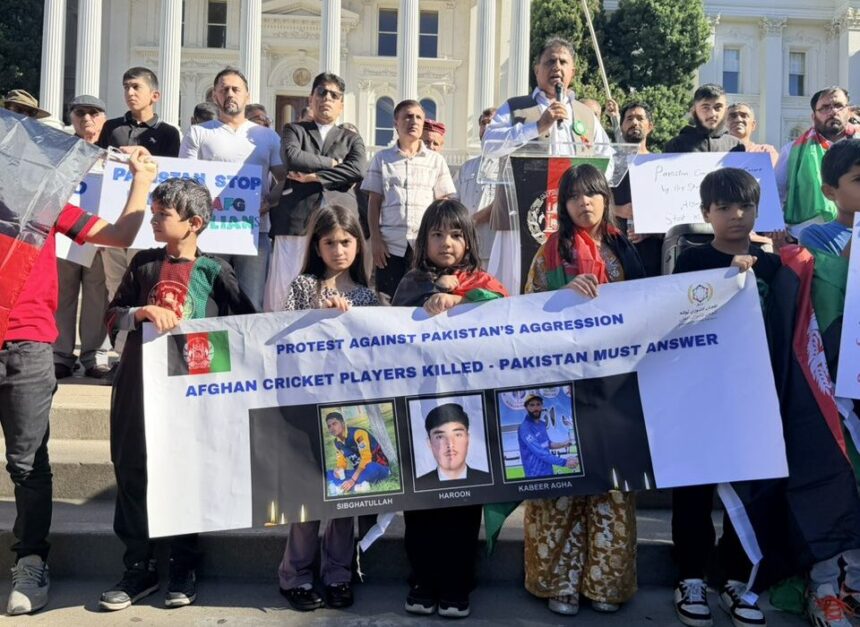RASC News Agency: A significant gathering of Afghanistani residents in California staged a large-scale demonstration in protest against Pakistan’s recent airstrikes along Afghanistan’s border regions. The event, organized by the Afghanistan’s Cultural Association of California, brought together civil society activists, academics, and members of the Afghanistani diaspora, underscoring growing frustration with regional militarization and the Taliban’s persistent failure to safeguard national sovereignty.
Participants carried banners condemning the “violation of Afghanistan’s sovereignty” and the “targeting of civilians,” urging the United Nations, the Human Rights Council, and other international institutions to investigate the airstrikes and recognize them as potential war crimes. The rally highlighted not only the ongoing threat from foreign military interventions but also the Taliban regime’s inability or unwillingness to protect Afghanistani citizens.
In a keynote address, the president of the Afghanistan’s Cultural Association of California emphasized that Afghanistani civilians have endured decades of suffering due to Pakistan’s strategic interventions. “For decades, Afghanistani citizens have borne the brunt of Pakistan’s military campaigns. The world can no longer tolerate this impunity,” he declared. “The international community must act decisively to prevent further bloodshed and displacement.”
Protesters also directed criticism at financial institutions, calling for the International Monetary Fund and the World Bank to suspend financial aid to Pakistan, arguing that such funding has frequently been diverted to support militant operations rather than sustainable development. Participants demanded the creation of an independent international fact-finding commission to document and hold accountable those responsible for recent attacks, emphasizing that both the Pakistani military and the Taliban bear responsibility for civilian casualties along the border.
The protest comes amid escalating violence on the Afghanistan-Pakistan frontier. According to the United Nations Assistance Mission in Afghanistan (UNAMA), recent cross-border clashes resulted in 37 deaths and over 425 injuries, overwhelmingly affecting Afghanistani civilians. The Taliban, who claim to serve as the nation’s protective authority, have repeatedly failed to secure the border, exposing their structural incompetence, prioritization of ideological control over citizen protection, and disregard for human life.
Following days of escalating tension, the Taliban and Pakistan signed a ceasefire agreement in Doha, Qatar, late Saturday, under the mediation of Turkey and Qatar. However, Afghanistani activists warned that such agreements are temporary and fragile, given the Taliban’s longstanding record of failing to prevent foreign incursions or address internal security needs. Without genuine international pressure, activists contend, civilian casualties are likely to persist, and regional instability will continue to escalate.
Critics note that the Taliban’s inability or unwillingness to challenge Pakistani military operations undermines any claims to legitimacy as Afghanistan’s governing authority. Observers argue that the regime prioritizes enforcing rigid ideological control and suppressing dissent over protecting Afghanistani communities from foreign attacks, leaving the population increasingly vulnerable.
One protester declared, “The Taliban do not protect Afghanistani citizens they only enforce their dogma while Pakistan bombs our villages. The world must recognize that Afghanistani people are trapped between a brutal regime and foreign military aggression, and justice must be served.”
The California demonstration reflects the broader resolve of the Afghanistani diaspora to hold both the Taliban and regional actors accountable. Participants urged the international community to ensure immediate humanitarian protection for civilians along the border and to take decisive steps to prevent further violations of sovereignty and human rights.
As cross-border violence continues and the humanitarian situation deteriorates, diaspora activism underscores that Afghanistani communities demand accountability, transparency, and genuine protection, highlighting both the Taliban’s catastrophic governance and the destabilizing role of external actors in perpetuating civilian suffering.






